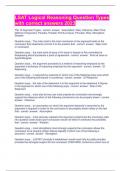Assignment 2 2024
Unique #:
Due Date: 18 June 2024
Detailed solutions, explanations, workings
and references.
+27 81 278 3372
, QUESTION 1
One-to-One Counting
In the initial phase of one-to-one counting, children are primarily concerned with
answering the "how many" question by counting objects individually. They count in
ones, which indicates that they have a basic understanding of cardinality—the
concept that a number represents a specific quantity. However, the idea of grouping
objects to make counting more efficient or to understand multiplication and division
remains foreign to them. At this stage, even if they can recite numbers in sequences
of 2s, 3s, or 5s, they revert back to one-to-one counting when asked to determine
the number of objects in a group. Their understanding is limited to seeing counting
as a temporary procedure rather than a permanent indicator of the total quantity in
a collection.
Application: To help children in this phase understand multiplicative concepts,
teachers could design activities that show different representations of the same
total number. For example, showing that 3 groups of 2 objects is the same as 2
groups of 3 objects helps to introduce the principle of commutativity. Using array
diagrams to visually organize collections of objects in rows and columns can also
aid in this understanding. This method makes connections to skip counting, helping
children transition from seeing counting as a temporary task to understanding it as
a stable indicator of quantity.
Additive Composition
In the second phase, known as additive composition, children start to grasp that a
quantity remains the same even if it is rearranged or counted in different ways.
Here, they begin to connect counting with the concepts of skip counting and
repeated addition. However, they often need to physically lay out objects in groups
before they can skip count or use repeated addition to find the total number. At this
stage, they understand multiplication as repeated addition but do not yet recognize
the inverse relationship between multiplication and division.
Varsity Cube 2024 +27 81 278 3372


